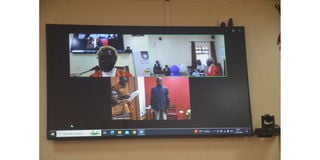Judiciary launches video conferencing system at Jinja High Court

Sulaiman Baduube appears before Jinja High Court Judge Dr Winifred Nabisinde via virtual court conferencing on September 17, 2024. PHOTO | TAUSI NAKATO
What you need to know:
- The initiative that is part of the Judiciary Information and Communication Technology (ICT) strategy 2015-2020, was proposed nearly a decade ago.
Litigants can breathe a collective sigh of relief as the Judiciary launched a video conferencing system at Jinja High Court to address case backlogs and other challenges. This secure platform allows participants in legal proceedings to appear remotely for trials or hearings, often referred to as a virtual courtroom.
The initiative that is part of the Judiciary Information and Communication Technology (ICT) strategy 2015-2020, was proposed nearly a decade ago.
Resident Judge Justice Winifred Nabisinde stated that the introduction of this virtual court system will save time and resources typically spent on travel. Currently, the backlog at the High Court and Chief Magistrate’s Court stands at 1,846 and 308 cases, respectively. Jinja High Court alone has 1,203 pending criminal matters, 1,471 civil cases, and 516 land cases, totaling 3,190 unresolved matters.
“The video conferencing system is partly a solution to solving the problem of delays caused by waiting for a person to be brought to court for trial and recording evidence from witnesses who may not find it convenient to physically travel to court,” Justice Nabisinde said on Tuesday.
In a demonstration of this new technology, Justice Nabisinde delivered a ruling remotely, allowing the defendant, who was on remand at Kirinya Prisons, to participate without leaving the facility. The ruling was in favor of 45-year-old Suleiman Baduube, who was acquitted of murder charges due to insufficient evidence from the prosecution.
Justice Nabisinde also highlighted that the system will enhance security at the court and during the transport of inmates. This is particularly relevant following a February 15, 2024 incident in which two criminal inmates were shot while escaping from Jinja Court, resulting in one fatality.
Mr Daniel Mudhumbusi, a lawyer noted that video court conferences will reduce case adjournments due to the absence of lawyers, judges, or litigants, calling the system “very effective.”
“It will reduce corruption at court because some of the judicial officers who ask for money will have no chance of doing it,” he said.
Principal Judge, Dr Flavian Zeija, described the virtual conferencing system as a crucial solution to the judiciary's case backlog, which stood at 42,953 cases by the end of July.
“The Judiciary has found it necessary to use ICT as part of the immediate solutions being engineered to tackle these bottlenecks. Video conferencing is an equipment directed towards the achievement of rights to speedy trial because justice delayed is justice denied,” Dr Zeija said.
He added that the idea of video conference started during the first Covid-19 when Uganda Prisons announced that their facilities should not be accessed because of fear of spreading of the virus.
Dr Zeija further revealed that the equipment has been installed in court circuits and their prisons, including Masaka, Mubende, Mbale, Gulu and now Jinja with support from United Nations Development Programme (UNDP).
He asked the UNDP to roll out the same technology to the remaining nine circuits and their respective prisons, including Iganga, Luweero, Moroto, Tororo, Kiboga, Kitgum, Rukungiri Bushenyi and Hoima.




